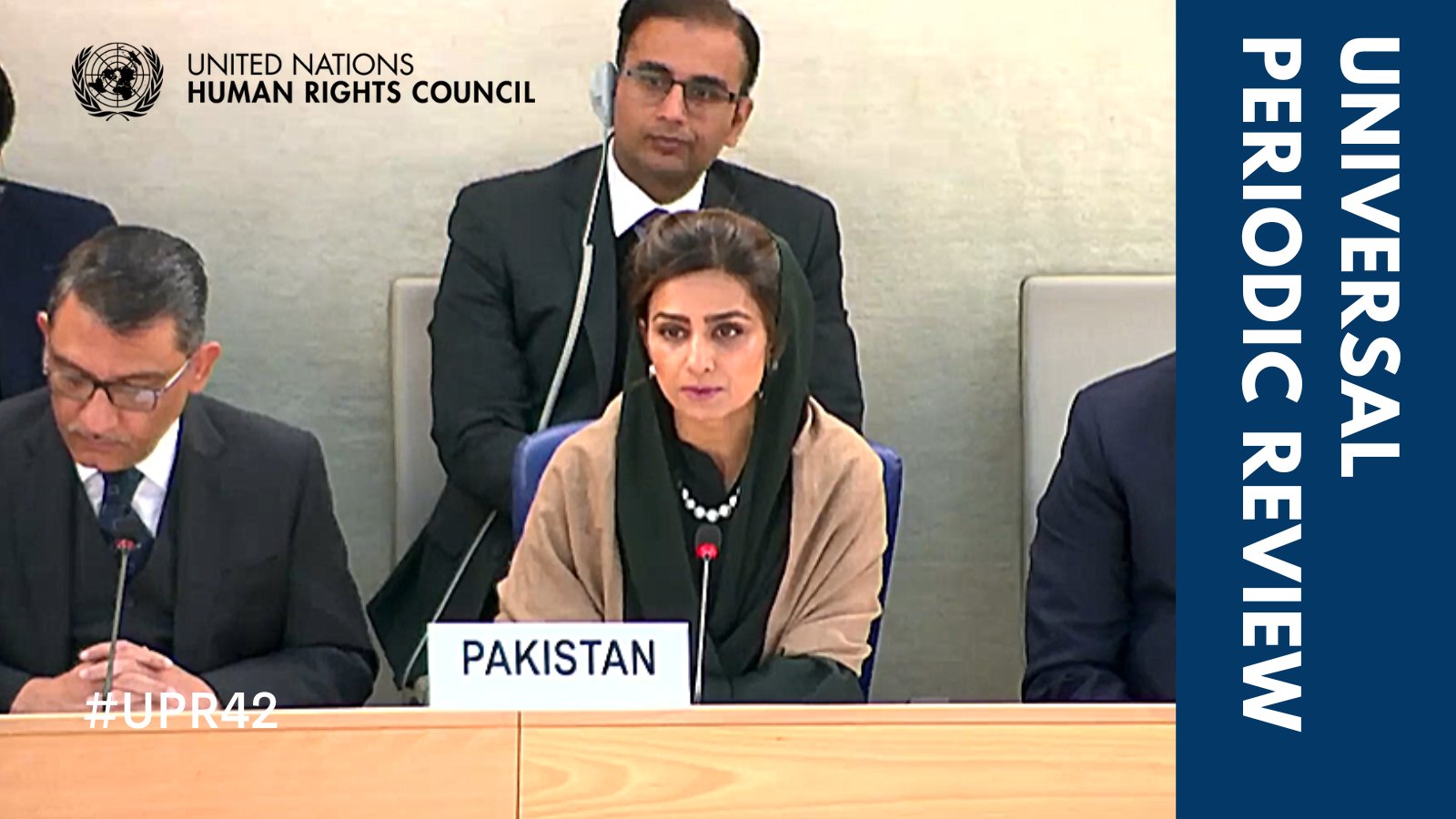GENEVA, Jan 30 (APP): Minister of State for Foreign Affairs Hina Rabbani Khar on Monday said that with the country’s human rights progress on an upward trajectory, Pakistan will continue to be a leading voice of the vulnerable and the oppressed.
“From drafting the Universal Declaration on Human Rights and the International Convention on Racial Discrimination to establishing the Human Rights Council, Pakistan has remained and will continue to be a leading voice of the vulnerable and the oppressed,” she stated here at the 4th Universal Periodic Review (UPR) of Pakistan.
The Human Rights Council through the Universal Periodic Review mechanism periodically reviews the human rights record of every UN member state. The ultimate goal of UPR is to strengthen the realization and enjoyment of human rights in a country.
Established in 2007, this peer-driven review mechanism provided a platform for dialogue and constructive engagement among states.
The Minister of State highlighted the enactment of legislations to safeguard rights of women and children including Women’s Property Rights Act, 2020, Zainab Alert, Response and Recovery Act 2020 and, Anti-Rape (Investigation and Trial) Act 2021.
She said that as an ardent supporter of multilateralism, Pakistan has consistently advocated dialogue, consensus, cooperation, and mutual respect as preferred vehicles to advance the global human rights agenda.
“Today, I am pleased to report that my country’s human rights progress is overall on an upward trajectory. We continue to aspire for a progressive and pluralistic society, which puts a high premium on respect for the human rights of everyone, in the words of our founding father Muhammad Ali Jinnah and I quote “as equal citizens of one State”, she maintained.
The Minister said that Pakistan’s 4th national UPR report was prepared through an inclusive, consultative process involving all national stakeholders. Critically, this report was an outcome of their extensive efforts during the last five years to implement the recommendations emanating from the country’s 2017 UPR, she added.
The Minister of State said that Pakistan was also proud of its vibrant civil society. “With our independent judiciary and legal community, civil society has played a vital role in public awareness-raising and advocacy about inclusivity, accountability, and transparency,” she mentioned.
Hina Rabbani Khar said that “While we are proud of our progress and achievements, we are mindful of the need to sustain the momentum and overcome the challenges. The Government has made utmost efforts to advance human rights through institutional, legal, and policy measures.”
Touching upon some of the critical areas of this progress that align with several recommendations emanating from Pakistan’s last UPR, the Minister of State said that in order to strengthen institutional support, the Government has enhanced the capacity of existing structures on human rights and established new ones.
“The Ministry of Human Rights has upgraded its Regional Human Rights Directorates for effective coordination with provincial stakeholders. Complaint cells have been established at the Federal and Provincial Directorates under the Human Rights Ministry for redressal and referral of human rights complaints.”
“We have further strengthened our domestic mechanisms to enhance the implementation of the international human rights conventions to which Pakistan is a State Party,” she added.
In addition to the existing Treaty Implementation Cells (TIC) at the Federal and Provincial levels, the Minister of State said that the Government has launched the ‘National Mechanism for Reporting and Follow-up’ project based on the United Nations guidelines and good practices.
Likewise, the Human Rights Ministry has established a Human Rights Information Management System, which has institutionalized data collection and analysis about human rights trends in the country, she said, adding, “This system has helped us craft evidence-based policy and administrative measures and prepare Pakistan’s periodic treaty bodies reports.”
The Minister of State said that in the last five years, Pakistan has enacted several progressive legislations in line with its international human rights obligations, focusing on the fundamental rights and freedoms of the vulnerable and the marginalized.
She said that Pakistan has taken several steps for women’s empowerment. “Last year, we amended the Protection against Harassment of Women at Workplace Act 2010 to broaden the definition of employees to include non-conventional workplaces and expand the definition of workplace harassment.”
“Our Parliament also enacted the Anti-Rape Act 2021 and the Enforcement of Women’s Property Rights Act 2020 to build legal deterrence against the menace of rape and deprivation of women of their property rights.”
In a landmark move, the Minister of State said that all provincial High Courts have established Gender Based Violence Courts; helplines and women’s police stations have been set up across Pakistan.
Our Parliament enacted one of the most progressive laws on transgender rights in 2018 to protect their fundamental rights like inheritance, education, decent work, property ownership, and participation in public affairs, she added.
“Additionally, we passed a law in 2020 to safeguard the rights of persons with disabilities in line with the Convention on the Rights of Persons with Disabilities and, in 2022, the ICT Senior Citizen Act to prevent discrimination against elderly citizens.”
The Minister of State said that the protection of child rights has also remained high on Pakistan’s national agenda. In 2020, the Zainab Alert, Response, and Recovery Act were legislated. An alert system for reporting missing children has been launched in its follow-up.
“Legislation prohibiting child labor is already in force in the country. The Ministry of Overseas Pakistanis & Human Resource Development has notified a Child Labour Cell to coordinate and devise a consensus-based National Action Plan with ILO’s technical assistance.”
“We have recently ratified the Optional Protocol to the UN Convention on Transnational Organized Crime on trafficking in persons (in November 2022). In line with best practices, we passed two separate laws on trafficking in persons and the smuggling of migrants in 2018.”
“Since the enactment of these laws, there have been more than 1,000 human trafficking investigations and 161 convictions,” she mentioned.
“Regarding minority rights, the Minister of State quoted the country’s founding father Quaid-e-Azam Muhammad Ali Jinnah as categorically saying, “You are free; you are free to go to your temples, you are free to go to your mosques or any other places of worship in this State of Pakistan. You may belong to any religion or caste or creed — that has nothing to do with the business of the State”.
She said that Pakistan’s Constitution, in its Articles 3 and 25, guarantees the right to equality for everyone without any distinction, including the fundamental freedom to profess religion and visit places of worship.
Individuals belonging to religious minorities are equal citizens of Pakistan, and as a responsible State, we are fully committed to protecting and promoting their fundamental rights and freedoms, she added.
“That is why the Government has taken swift action against any reported incident. It is a matter of public record that more Muslims have been charged under blasphemy law than non-Muslims,” she stated.
To curb the misuse of blasphemy laws, the Minister of State said that the Government has instituted several administrative safeguards. For example, Section 211 of the Pakistan Penal Code stipulates punishments against anyone who intentionally initiates false charges.
The Government has notified the National Commission of Minorities to protect and promote minority rights, she said, adding, “We have established a Minorities Welfare Fund for development schemes and maintenance of minorities’ religious sites.”
In a landmark decision, the Minister of State mentioned the Islamabad High Court’s ruling that any marriage with an individual under 18 years old is void ab initio.
To curb torture and protect fair trial and due process rights, she stated that the government has enacted the Torture and Custodial Death Act in 2022.
In compliance with the UN Convention against Torture provisions, of which Pakistan is a State Party, the Act elaborates a comprehensive definition of ‘torture’; criminalizes torture, death, and rape in custody; and reinforces the right of the victims to legal remedy, as guaranteed in our Constitution, she added.
To handle juvenile cases in a human rights-responsive manner, the Minister of State said that the Juvenile Justice System Act was enacted in 2018. “This detailed legislation lays out a mechanism to verify the alleged offender’s age, stipulates the provision of legal assistance to juveniles at State expense, and encourages social rehabilitation and reintegration by establishing observation homes and rehabilitation centers.”
“New jails are being constructed in many parts of the country to reduce prison overcrowding. By encouraging alternatives to incarceration, provinces are also amending their parole laws for assessing offenders’ risks and needs, ensuring that conditions of release or license are met and rehabilitation provided.”
The Minister of State said the Government has also completed a detailed study about the situation of women prisoners in the country and advised all relevant authorities that international standards and best practices, as contained in the Nelson Mandela and Bangkok rules, are implemented during prison management.
Pursuant to the recommendation accepted during the last UPR, a draft bill that criminalizes enforced disappearances as a separate offense was undergoing parliamentary procedures, she said, adding, “We have a clear policy of zero tolerance against this heinous crime.”
The Commission of Inquiry on Enforced Disappearances expeditiously examines and addresses alleged cases of missing persons. The Commission continues to provide a free-of-cost legal remedial platform to affected families at the grass-root level, she added.
The Minister of State said the Commission’s overall disposal rate of cases was more than 70 percent, which was very encouraging.
Pakistan had imposed a moratorium on the death penalty for several years, the Minister of State said, adding, however, the moratorium was lifted after the horrendous terrorist attack on Army Public School (Peshawar) in 2014.
She highlighted that the death penalty was only applied in the most serious crimes in full compliance with due process of law, under a final judgment rendered by a cmpetent court, and with the right to seek pardon or appeal for commutation.
“There have been no executions in Pakistan since December 2019, and between 2010 and 2018, the Supreme Court overturned death sentences in 78% of cases. In 2021 the Supreme Court of Pakistan, in a landmark ruling in Safia Bano v. Home Department, established critical safeguards and protections for defendants with psycho-social disabilities. In line with the ICCPR, the Court barred the execution of mentally challenged individuals.”
Furthermore, the Minister of State said that Pakistan continues to internally review colonial-era laws to narrow the scope of capital punishment. “As a result of this review, we amended the Railway Act in October 2022, reducing capital punishment to a life sentence for acts of sabotage targeting railway networks.”
“We attach high importance to the freedom of opinion and expression. To this end, the landmark Protection of Journalists and Media Professionals Act was enacted in 2021. In the follow-up to the Act, a Commission is being constituted, which will serve as a grievance redressal platform for journalists in cases of harassment, intimidation, and physical attack.”
To meaningfully operationalize people’s constitutional right to information, the Minister of State said that the government has significantly empowered Pakistan Information Commission as an autonomous body.
“The constitution of Pakistan guarantees freedom of peaceful assembly, and the people have continued to enjoy this right,” she added.
As an active member of the Human Rights Council, the Minister of State that Pakistan believed in constructive engagement and cooperation with the UN Human Rights machinery, adding, Pakistan regularly reports to the relevant Treaty Bodies about the implementation status of the international human rights conventions to which it was a State Party.
“In 2022 alone, we submitted our periodic reports under the international conventions on civil and political rights; torture; child rights; and elimination of racial discrimination. In 2020, during our systematic review, the Committee on the UN Convention on Elimination of Discrimination against Women recognized Pakistan’s domestic efforts in this area.”
“We have consistently extended political and financial support to the Office of the High Commissioner for Human Rights. Pakistan also has extended invitations for country visits to four Special Procedures on Foreign Debt, Extreme Poverty, Education, and Disabilities,” she added.
The Minister of State said that Pakistan has also endeavored to respond regularly to the communications sent by the UN-independent human rights experts.
“We are determined to leave no stone unturned to promote our citizens’ welfare, well-being, dignity, freedoms, and rights,” she maintained.
The Minister of State said as a democratic representative, she fully believed that any government’s raison d’être was to improve people’s lives and livelihoods, which means realizing and enjoying their fundamental rights and needs.
“At international human rights platforms, Pakistan will continue to endeavor to build bridges and promote consensus, constructive engagement, and dialogue,” she resolved.
The Minister of State thanked the Troika members-Argentina, The Gambia, and Nepal-for facilitating Pakistan review.
She said since its establishment 15 years ago, the UPR mechanism has served as a solid platform for engagement and dialogue. It has stimulated concrete progress in promoting human rights based on time-tested principles of sovereign equality, universality, non-selectivity, and indivisibility of all rights.
“It represents an excellent global best practice to deliberate and develop recommendations to advance universal respect for rights, freedoms, and dignity for all. Therefore, preserving this cooperative mechanism as an enabler of dialogue among States must remain a shared priority,” she maintained.






